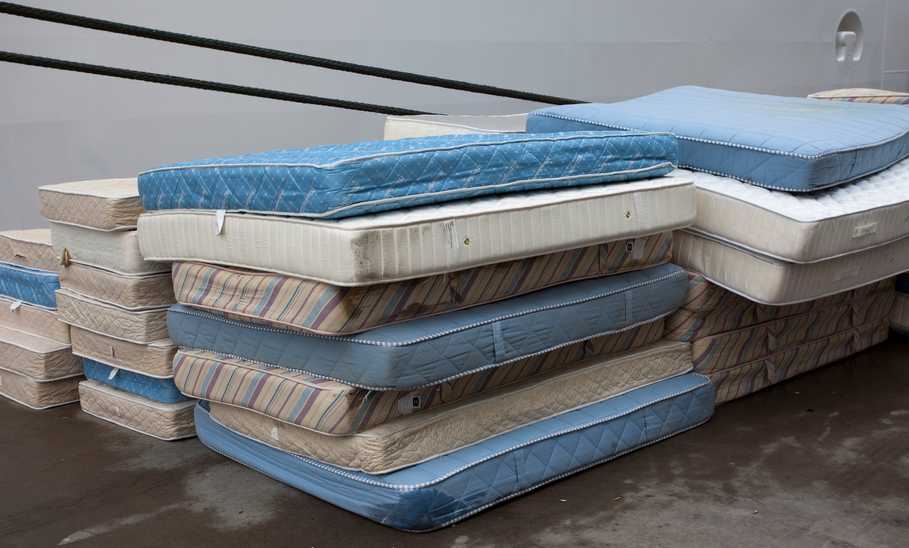How to Dispose of a Mattress: A Guide to All Your Options

Our evaluations and opinions are not influenced by our advertising relationships, but we may earn a commission from our partners’ links. This content is created by TIME Stamped, under TIME’s direction and produced in accordance with TIME’s editorial guidelines and overseen by TIME’s editorial staff. Learn more about it.
Mattresses are your friend: Your supportive sleeping buddy, your comfy place of refuge, your literal land of dreams. They’re also big, heavy, astonishingly expensive, and potentially very annoying to get rid of once they need replacing. There are, at least, multiple options for the latter, so read on to find out how to dispose of a mattress as painlessly as possible.
First, a key question.
Mattresses tend to have a lifespan of around eight to ten years, so if your mattress is older than that, it’s likely you’ll need to replace it soon. “Even with proper cleaning, older mattresses tend to experience a decline in hygiene,” warns Diana Ciechorska, Founder of Park Slope Cleaning in New York, N.Y. That means your mattress could be home to all manner of molds, stains, lingering odors, allergens, or other unwanted additions, none of which you want to spend eight hours every night rubbing your body on.
Even if your mattress hasn’t yet reached retirement age, it may be time to replace it if it’s simply not working for you. If you wake up with back or neck pain, or if you’re struggling to get comfortable enough to fall or stay asleep most nights, your mattress is probably at least partially to blame. Now, comes the challenging part: Finding an easy way to dispose of your old mattress.
There are many ways to rid yourself of a mattress, from recycling to donation to straight up disposal. Below, tips and advice for how to dispose of a mattress, whichever method you choose.
Around 80% of the average mattresses can be recycled, including the foam padding (which can be turned into insulating materials), springs (which will likely be melted down and reused), and other fibers (which can be used for anything from making new products to simply being burned as fuel).
Per the Mattress Recycling Council, every day, an average of 50,000 mattresses are discarded in the U.S. alone, and although they add that up to 75% of these could potentially be recycled, according to the National Bed Federation, the actual figure is closer to 14%. Since mattresses take up so much space in landfills, some states—California, Rhode Island, and Connecticut, so far—have introduced laws making it compulsory for mattress manufacturers to give consumers an easy way to dispose of their old mattresses responsibly.
If you’re looking to recycle your mattress yourself, the first step is to call your local waste management organization and ask if they have a mattress recycling program. If they do, they’ll be able to tell you where you should drop it off, or possibly even arrange to have it picked up for you.
If you don’t have any luck with that, the next step is to try calling around your local recycling centers, which you can find easily with Earth 911’s handy search tool. It’s best to call the recycling center first, rather than just showing up, on the off chance they don’t accept mattresses—as annoying as making a bunch if calls is, it’s nothing compared to the frustration of loading a mattress into your car and driving 20 miles only to have to lug it home again). They will likely ask what type of mattress it is, so if you’re not sure, check first to see if it’s memory foam, box spring, or something else.
Since mattresses take a fair amount of effort to recycle (the metal springs have to be manually separated from the rest of the materials), some recycling centers will charge a small fee, usually in the $20-$40 range.
When you’ve found a convenient place to drop it off, simply strip the mattress of all bedding and follow any drop-off instructions you were given.
Believe it or not, donating your mattress is another great option, particularly if it’s still in good shape. While light wear and tear is generally acceptable, it’s unlikely charities or shelters will take a mattress that’s visibly stained or torn (more serious issues like bed bugs or mold are an absolute no-go). Here are some options to consider.
You’ll never fail to be amazed at how many people out there are looking to get hold of the exact thing you’re trying to get rid of. Sites like Craigslist or Facebook Marketplace (or search for “Buy Nothing” Facebook groups) are a convenient way to dispose of unwanted furniture: Simply snap a few pics of your old mattress, upload them, and with any luck, you’ll have someone offering to take it off your hands inside of a week. If your mattress is in really good condition, you may even be able to sell it, rather than giving it away.
Another great option is Freecycle, which functions much the same way. Available in over 5,000 towns around the country, it's well worth checking if they’re available in your area.
With more than half a million homeless people in America, anything you can do to help out those in shelters and other temporary housing is worthwhile. This includes donating your old mattresses. There are several organizations operating either nationwide, or close to it, all of whom will be happy to take that gently used mattress off your hands:
It’s also a good idea to search for regional organizations that are willing to accept mattress donations, such as New Jersey’s Furniture Assist, Inc. To make your search easier, Donation Town will help you to find a charity near you that’s willing to accept mattress donations. You can also just call homeless shelters in your area and see if they’re in need of mattresses.
As mentioned earlier, if you live in California, Rhode Island, or Connecticut, state laws there make it much easier to work with mattress retailers to find a way to dispose of your old mattress. But if you live elsewhere, you should still ask the store where you’re buying your new mattress if they’ll take away your old one. If they don’t offer this service, many will instead point you in the direction of a local organization that will happily take the mattress of your hands.
If you’re looking to get your mattress picked up with the rest of your trash, you’ll need to call your local municipal waste disposal organization to find out how it works in your area, since it differs depending on where you live. In Princeton, N.J.., for example, mattresses can be disposed of as bulk items, provided a reservation has been made in advance, and the mattress has been wrapped in plastic before being placed at the curb. In Boise, Idaho, large items, including mattresses, can be scheduled for pickup by calling Republic Services. In Orlando, F.L., up to two large items will be picked up for free on yard waste days. So find out what the deal is in your town, and someone will be by to haul it away before too long.
If you’re super handy, you could try disassembling the mattress yourself and reusing its constituent parts. Some ideas for things you can make include:
This option isn’t for everyone, obviously, but if you have a creative streak—and plenty of time on your hands—it might be the right choice for you. As a safety precaution, work in a well-ventilated area and always use a dust mask, protective eyewear, and heavy duty gloves when taking apart a mattress.
As discussed earlier, most of these options are free, such as donating, or having it picked up with the trash. Most recycling is also free, but some may have a small charge (generally $20-$40) for the labor involved.
It’s not a good idea! Many states and cities have laws to prevent this kind of thing, and depending on how strict the laws are, where you left it, and what condition it was in, you could be looking at anything from a steep fine to community service. Texas, for example, regards illegal dumping as a serious crime. Don’t do it!
Again, check your local area’s rules for this, and definitely mention it if you’re arranging for a bed bug-infested mattress to be picked up with your trash. You can also check with your regional department of health: In New York City, for example, the rules for disposing of a bed bug-ridden mattress are as follows:
You can certainly arrange to have your mattress picked up with the regular trash, but you can’t just dump it on the curb without warning. Always check your local laws and regulations around mattress disposal before taking any action.
The information presented here is created by TIME Stamped and overseen by TIME editorial staff. To learn more, see our About Us page.



